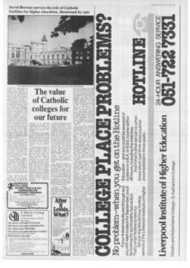Page 5, 20th August 1982
Page 5

Report an error
Noticed an error on this page?If you've noticed an error in this article please click here to report it.
Tags
Share
Related articles
The End Of A Long Journey Home
By Malcolm Muggeridge
Memories Of Malcolm Muggeridge
Cardinal Pays Tribute To Muggeridge
Electrifying, Enormously Civilised, Urbane, Hard-headed,...
A version of Muggeridge
MALCOLM Muggeridge, it appears is in training. After decades of globe-trotting, he stays resolutely at home, as busy and alert as ever, but always giving the impression that he is getting ready for his "long home" as the Anglo-Saxons used to call it. He comtemplates death with domestic equanimity.
"I hope there won't be too many years . . . I'm in my 80th year now. There are still a lot of things left to finish. I sometimes try to take on too much."
And is it still worth fighting a rearguard action?
"Oh, I'm quite sure of it. We've got to fight to the last ditch."
It was a Sunday and the larks were starting perpendicularly from the tangle of meadowsweet and brambles beside the railway embankment as the train pulled in to a little Sussex station, snoozing away in the after-lunch heat haze. Muggeridge insisted on collecting me from the station. I expected an old black car. It turned out to be a bright red new one. Probably foreign made.
He was dressed in an opennecked light blue towelling shirt and worn-in grey trousers. His locks of white hair flew up and down above a tanned pate in the draught from the window. Past the Ostrich public house, and a sharp deceleration to avoid a little girl on her bicycle on the wrong side of the road. Then out of the village and along a narrow road between unfenced harvested fields, black on one side from burnt stubble.
His wife Kitty sat on the sofa of the sitting room of the little farmhouse, leaning back on the cushions, silhouetted against the window and the valley of bright corn behind.
Over tea (three cups from a large chipped enamel pot with a bandaged handle). Muggeridge began to turn the big guns on society at large.
The first target was television. The day was coming when the lives of ordinary people would be one long fantasy from morning to night for as long as they lived. Videos are even worse and there are all the horrors in prospect of cable and satellitebeamed television.
"We haven't got a television, but sometimes I get to see a bit of myself on television and think, 'Is this really me?' There is a danger of schizophrenia. Several people have committed suicide because of this."
Wilson, about a man who meets his doppelganger, was very horrific, he said, and this is what happens in appearing on television.
I see the problem. Who is this man? Muggeridge the prophet contradicting each new orthodoxy as it arises. Muggeridge the media celebrity — fulminating against the media Muggeridge the hero — the man Richard lngrams looks up to. Saint Muggeridge — friend of Mother Teresa and ascetic recluse in the Sussex countryside.
But Muggeridge has no doubts about his principles, even if he doubts his identity. The acquittal of a Derby doctor, for example, on a gharge of attempted murder after the death of a handicapped girl in his care. His innocence would deter the prosecution of the clearly guilty. "This judgement means that there will be no stopping murder. Other doctors .will go on killing the mongol children."
Mr Muggeridge was involved in an action for contempt of
court when he wrote an article defending the right to life of handicapped children during the Derby case. The Daily Mail defended the action and won, but only by taking it as far as the House of Lords.
"We followed the passing of the 1967 Abortion Act very closely. Even David Steele who introduced it said afterwards that he never thought that it would end up like this.
"There's no stopping the murder now. Even if an amendment to the Abortion Act were passed, the doctors would go on the same.
"The business of killing babies that the doctors think have something a little wrong with them will continue quite openly now. No one will bring an action against a doctor. It is like the consequences of the Bourne case when a perfectly good doctor performed an abortion and was found innocent in court."
Muggeridge thinks things are getting worse; that civilisation is heading for destruction; that the trend is irreversible. "Put very simply, it is the devil. Bad thought is very difficult to reverse. It is impossible to change the moral consensus in this society. Christendom is coming to an end."
"It would be a very interesting study to look at the words which have been introduced recently. It is a change of thought. The same' has happened in the liturgy. They have removed the word sin. They have already got a new version of the Lord's Prayer."
Television, books, newspapers — Muggeridge's bread and butter for 50 years — are in his view rotten and moribund. "Publishers are scratching their heads wondering what to publish And, you know, publishing porn is very wearisome work. I was on the television with a well-known woman rovelist — I don't know what her name was — and she said she had had a manuscript returned by the publishers and had been asked to ginger it up a bit — put some more porn in it."
The press is as bad. If the circulation of the Guardian, his old newspaper, was rising, this was only because it reflected the consensus, a consensus that is being imposed by a few people in newspapers and on television, and not by particularly good or wise people. In its Manchester days (Muggeridge was there from 1930-1932) the Guardian had made its name by opposing the consensus.
Things were as bad in America, but there, strangely enough, an enormous interest was being shown in writers whom the English neglected — Chesterton, for example. And himself, had they started to write theses about him?
"There has been one, and then there was Ian Hunter's biography. But oneself is not a very interesting subject. I read the biography and I read essays and reviews, but subject one knows about already is oneself."
Kitty remembered a portrait of Malcolm by some artist. She could't see in it the man she had been married to for more than 50 years. Then one day she saw him caught as the artist had seen him. Everyone sees things with different eyes. For all his campaigning work, Muggeridge doesn't suppose he has stopped one murder by abortion or euthanasia. Kitty remembers her brother who was 80 and broke his leg. She went to see him in hospital and asked what treatment he was being given. None. The nurses were very kind. A few days later he was dead. She suspects heavy doses of sedatives.
But Muggeridge doesn't think individuals can change this terrible new consensus in society.
Kitty, very frail, with arms and hands showing the tan marks of age, sits clasping her slender legs in her denim skirt. "And these people who speak about the population explosion," she says," I ask them why they don't kill themselves if they think there are too many people. But, you see, it never applies to them."
Behind her stands a picture of of Mother Teresa. Here was one exception that the media had not been able to spoil, Muggeridge thought. They did their best to spoil the Pope's visit. And he agreed that the Pope was by no means a stupid man. "He is the ideal man — a cardinal from a communist country. He knows all about dialogue and knows what it really means. But he doesn't seem to be able to exert authority. The American bishops just go on the same way whatever he says about Humanae Vitae."
While Muggeridge goes out of the room to look after the ritual glass of sherry for his guest (none for him) and put on his battered navy blue guernsey for the hospitable drive back to the station, Kitty chides me for attempting the washing up.
Women's lib has done a lot of harm, she says. Women have done a lot of harm. It began with a loss of respect for chastity. (The way she explains it makes it sound anything but the reproach of a Puritan). When people asked her what she did, she replied: "Nothing really," and they were shocked. But what did these women get — a dull little job which probably bored them, and then the marriage breaking up.
"Get married," she advised, "It's very good and the bad bits make a marriage."
The rabbits pretended not to be there in the long shadows of the corn stubble. We bumped over the potholed tarmac. A few more years of rearguard action lay ahead. "I'm quite quite sure it's worth it. We've got to fight to the last ditch."
blog comments powered by Disqus











